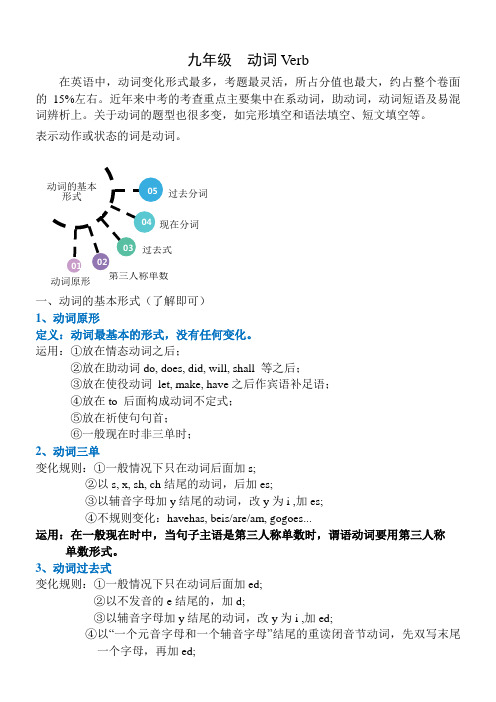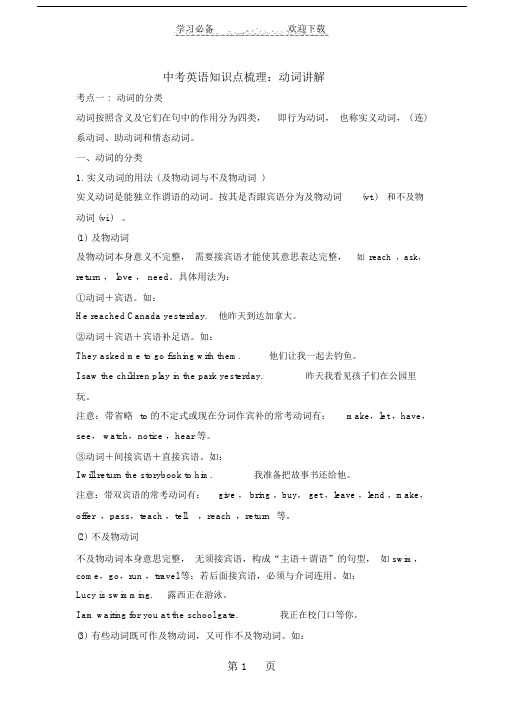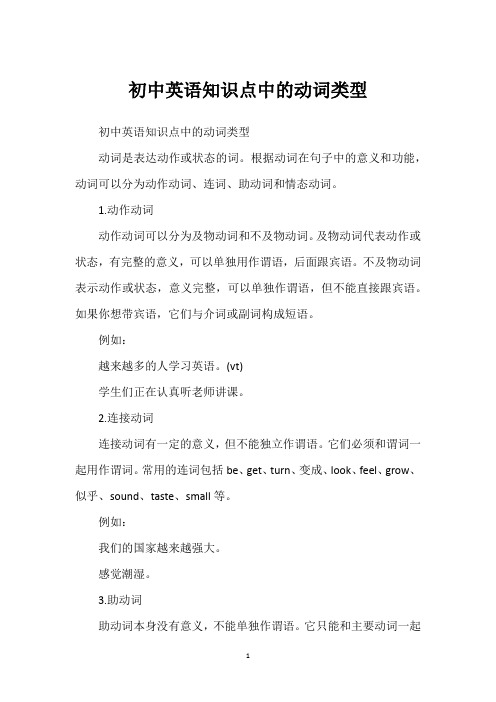【火线100天】中考英语 基础语法八 动词的分类
中考英语 第二部分 语法专题研究 专题八 动词 人教新目标版

◆ 及物动词
及物动词本身意义不完整,需要接宾语才能使其意思 表达完整,如tell, take, ask, make, reach等。如: He reached Canada the day before yesterday.他前天到 加拿大的。
现学现用
第一节 动词的分类与辨析
考情概览
动词辨析是湖南各地市近3年中考的重要考点。命题 点主要有以下三个方面: 1. 动词语境辨析:主要在完形填空中考查,单项填空中 较少涉及。 2. 近义动词辨析:主要在单项填空中考查。 3. 系动词:仅在单项填空中考查过一次感官动词词义辨 析(look)。
直击中考考点
5. —I’m sorry I left my homework at home. Shall I go and ___A___ it? —No, you needn’t. Bring it here tomorrow. A. get B. send C. carry
6. —Who ___C___ the tennis game yesterday? —Jack. He all the others. A. beat; won B. won; won C. won; beat
考点精讲
动词词义辨析是湖南近3年中考完形填空的考查重 点,在单项填空中考查较少。同时,单项填空与完形 填空中也会涉及近义动词辨析,如花费(take, cost, spend与pay)、穿(put on, wear, dress与be in)、 说话(tell, talk, speak与say)。
命题点1 实义动词(3年3考83次)
【英语】中考英语第二部分语法专题复习八动词

【关键字】英语(八) 动词I.单项选择。
(C)1.—Can I borrow your English book,please?—Sure.But you must ________ it to me soon.A.keep B.buyC.return D.hold(B)2.—Have you ever listened to the song Baby?—Yes,it ________ wonderful.All of us like it very much.A.smells B.soundsC.looks D.tastes(D)3.—How about the silk skirt?—It ________ soft!I'll take it.A.tastes B.soundsC.smells D.feels(A)4.After the serious illness,he finally ________ how important health is.A.realized B.meantC.added D.impressed(C)5.The old man's eyesight isn't very good.He often ________ Tim for Jim.A.regards B.treatsC.mistakes D.thinks(C)6.—Why is Lily so popular among the students?—Because she often ________ us with help and care.A.gives B.offersC.provides D.supports(D)7.—Do you think Houston Rockets will beat Lakers?—Yes.They have better players,so I ________ them to win.A.hope B.thinkC.depend D.expect(B)8.—How long do you think the terrible weather will ________?—Why not listen to the weather report?A.appear B.lastC.change D.discover(A)9.Listen!The whole class is quiet now.It ________ that everyone falls asleep.A.seems B.looksC.sounds D.gets(D)10.—How long can I ________ this novel Gulliver's Travels?—Only two weeks.A.borrow B.lendC.return D.keep(B)11.Wow,the dish ________ delicious.Could you please tell me how to cook it?A.keeps B.tastesC.sounds D.feels(C)12.—Why does Zhang Lei look unhappy?—Because her best friend didn't ________ her to go on a picnic.A.make B.letC.invite D.refuse(B)13.David ________ his friend's invitation to the picnic in order to stay at home and have a good rest.A.expected B.refusedC.received D.told(A)14.—Who's that boy in the red coat?—He is my new friend.Let me________ him to you.A.introduce B.tellC.promise D.say(C)15.Fresh food is go od for you.But you have to ________ it first because sometimes it is a little dirty.A.taste B.smellC.wash D.plant(C)16.—May I go to the cinema,Mum?—C ertainly.But you ________ be back by 11 o'clock.A.can B.mayC.must D.need(C)17.—________ I speak to May,please?—I'm sorry she ________ come to the phone because she is busy now.A.Might;won't B .Can;mustn'tC.May;can't D.Could;shouldn't(D)18.—I want to know if I ________ smoke here.—No,you ________.Could you see the sign “NO SMOKING” there?A.can;needn't B.must;can'tC.shall;won't D.can;mustn't(A)19.—Whose notebook is this?—It ________ be Tom's.It has his name on it.A.must B.mayC.might D.can't(A)20.—________ you pass me the dictionary,please?—Sure.Here you are.A.Could B.NeedC.Must D.Might(D)21.—Must I go there with you?—No,you ________.David ________ go with me.A.mustn't;can B.can't;mustC.don't;should D.needn't;may(B)22.You ________ be careful when crossing the road—the traffic lights aren't working.A.might B.shouldC.could D.may(C)23.—Could I borrow your ruler?—Yes,of course you ________.A.will B.shouldC.can D.need(D)24.You ________ return the book now.You can keep it until next week if you like.A.have to B.can'tC.mustn't D.needn't(C)25.The fire spread through the hotel very quickly but luckily everyone ________ get out.A.had to B.wouldC.was able to D.could(C)26.—Is Paul coming by train?—He should,but he ________.He likes driving his car.A.can't B.needn'tC.may not D.mustn't(A)27.—Isn't that Ann's husband over there?—No,it ________ be him.I'm sure he doesn't wear glasses.A.can't B.must notC.won't D.may not(B)28.Susan,you ________ leave all your clothes on the floor like this!A.wouldn't B.mustn'tC.needn't D.may not(C)29.—Listen!Someone is singing in the next room.Who ________ it be?Is it Zhu Lei?—No.It ________ be her.She is at school now.A.will;may notB.must;mustn'tC.may;can'tD.may;won't(A)30.Susan's parents have bought a large house with a swimming pool.It ________ be very expensive.A.must B.canC.mustn't D.can't(D)31.—You________wash the clothes by hand.We have washing machines.—I'm not sure.I think he________ die in a battle in 1943.A.can't B.mustn'tC.might not D.don't have to(B)32.—You can sit and read the books here if you ________.—Thank you very much.A.can B.willC.may D.must(A)33.—Must I wash all the clothes this afternoon?—No,you ________.A.don't have to B.mustn'tC.can't D.may not(C)34.—________ the work be finished by the end of this week?—Yes,it must.A.Will B.ShallC.Need D.Can(C)35.Bob is taking the desks away because they ________ too much room.A.sta nd up B.pick upC.take up D.listen up(D)36.—Tom,it's cold outside.________ your coat when you go out.—OK,Mum.A.Take off B.Take awayC.Put away D.Put on(A)37.In the song I Bet My Life,the US rock band Imagine Dragon tells people never to ________ their dreams.A.give up B.give outC.give in D.give off(B)38.—When will Han Han's new book ________?—Sorry,I don't know.I'm looking forward to his new book,too.A.come on B.come outC.come in D.come over(B)39.—Great changes have taken place in this city.—Right.Many modern buildings have been ________ these days.A.turned up B.set upC.shown up D.fixed up(C)40.Don't worry!I'm sure you'll ________ your classmates if you are kind and friendly to them.A.catch up with B.agree withC.get along well with D.make friends with(C)41.—Is the man over there ler?—It________ be him.He has gone to Shanghai on business.A.might B.mustC.can't D.mustn't(B)42.People have________ too many trees to make desks,chairs,chopsticks and so on.A.cut up B .cut downC.put up D.put off(C)43.As we're students,we________ obey the school rules.A.can B.mayC.must D.could(C)44.Don't waste your time.You should________ your w ork.A.hang out B.look forC.concentrate on D.go by(C)45.—Must I clean the room now?—No,you________.You can do it tomorrow.A.mustn't B.may notC.needn't D.wouldn't(A)46.—How is your father going to Nanning?—I'm not sure.He________ drive there.A.may B.canC.must D.will(D)47.—Don't ________,boys and girls.Keep working hard and you will win the exam.—Th ank you, try our best.A.put up B.call upC.set up D.give up(A)48.—Do you know the latest information about Oriental Star(东方之星)?—I've no idea.Let's________ the TV and watch the news report.A.turn on B.turn downC.turn up D.tur n off(B)49.—Where is Mary?—She ________ in the library.A.should be B.must beC.can be D.must have been(C)50.His room is dark.He must ________ to bed.A.go B.be goingC.have gone D.have been gone(B)51.—Do you like the music the Moonlight Sonata?—Yes, it ________ really beautiful.A.feels B.soundsC.listens D.hears(C)52.—Guess who is coming to sup per.—I don’t know.________ me.A.Speak B.Say C.Tell D.Tell(D)53.Excuse me.May I ________ you to pass me the sugar ?A.keep B.make C.let D.trouble(A)54.—Who jumps the farthest in your school ?—Henry ________ .A.does B.jumps C.has D.is(C)55.—Where is Tom?—He hasn't come to school today.I think he ________ be ill.A.has to B.will C.may D.need(A)56.—The problem is too hard t o ________.Will you give me some advice?—There are many ways, but the most important is to have a careful plan.A.work out B.look out C.hand out D.put out(A)57.The children are making too much noise.I can't ________it.A.stand B.hearC.consider D.know(D)58.I missed the last bus, so I ________ go home on foot.A.must B.have to C.may D.had to(C)59.Please ________ the picture.Can you ________ a bird?A.look; see B.see; look atC.look at; see D.see; look(B)60.If you see any litter on the school playground ,you’d better________.A.give it away B.pick it upC.turn it off D.put it onII.词语运用A)用括号内所给单词的适当形式填空。
中考英语语法专题八动词分类及动词短语》(考点精讲+典例解析20ppt)(牛津译林版)

❖4.need的用法 ❖need 表示“需要,必须”。主要用于否定 句和疑问句中,否定形式为needn't,表示 “没有必要,不必”;回答need引导的问句 时,肯定回答用must,否定回答用 needn't。 此外need还可以作实义动词使用。如:
❖—Need we do some cleaning now?
❖1.状态系动词:只有be一词。如:
❖They are always very happy. 他们总是很 高兴。
❖2.持续系动词:表示主语继续或保持一种 状况或态度,主要有keep, remain, stay, rest, lie, stand。如:
精品文档
❖3.表象系动词:表示“看起来好像”,主 要有seem, appear, look等。如:
专题八 动词分类及动词短语(duǎnyǔ)。专题八 动词分类及动词短语
(duǎnyǔ)。协助主要动词构成谓语动词的词叫助动词。系动词亦称连系动词。[
提醒]有些系动词也是实义动词,可单独作谓语。情态动词有自己的词汇意思
,但不能独立作谓语,其后须跟动词原形。He said he would visit the Great
❖They have decided to put off the meeting.
❖=They have decided to put the meeting
off.
精品文档
❖2.动词+介词:常见的有ask for, care about, look for, look after, send for, laugh at, hear of(from)等。如:
精品文档
❖6.should和would ❖should用于各种人称的句子中,强调义务 或责任;would是will的过去形式,与动词原 形构成过去将来时,可用于多种人称,表示 意愿。如: (biǎoshì)
中考英语专项 动词分类及动词专题短语

动词分类及动词短语一,动词分为:助动词,系动词,情态动词和实义动词。
1,助动词:do ,does ,did ,will ,shall ,have ,has ,had ,would ,should等构成各种时态的否疑句的词。
本身无词义。
不能单独做谓语。
和后面的动词一起构成谓语。
2,系动词:系动词亦称连系动词。
本身有词义,不能单独用作谓语,和后边的词一起构成谓语。
1).状态系动词:只有be动词。
如:They are always very happy. 他们总是很高兴。
2).持续系动词:表示主语继续或保持一种状况或态度,主要有keep, remain, stay, rest, lie, stand。
如:I hope you'll keep fit. 我希望你会一直保持健康。
3)表象系动词:表示“看起来好像”,主要有seem, appear(似乎,显露)look。
如:My mother seems very satisfied with my progress.妈妈对我的进步似乎很满意。
4).感官系动词:表示“……起来”,主要有feel(摸起来,感觉),smell(闻起来), sound(听起来), taste(尝起来,吃起来)等。
如:The dish smells delicious. 菜闻起来很香。
5).变化系动词:表示主语变成什么样,主要有become,grow, turn, fall, get, go, 等Eg:He fell ill yesterday. 他昨天病了。
The small town is becoming busier and busier. 小镇变得越来越忙碌。
6).终止系动词:主要有prove, turn out(结果是,证明是)等。
如:My plan turned out a success. 我的计划成功了3,情态动词:表示说话人的语气、情态,无人称和数的变化。
中考英语总复习 动词的分类

动词的分类种类:实义动词,连系动词,助动词,情态动词。
一. 实义动词。
实义动词是能独立作谓语的动词。
按其句法可分为及物动词和不及物动词。
按其持续性可分为延续性动词和非延续性动词。
1.及物动词。
及物动词本身意义不完整,需要接宾语才能使其完整。
1)动词+宾语 we like this book very much.2)动词+宾语+宾补 we call the bird Polly We saw the children play in the parkyesterday注意,带省略to的不定式作宾补的动词,make let have see watch notice hear.3)动词+间接宾语+直接宾语Please pass me the book.常见带双宾语的动词有:give bring buy get leave lend make offer2.不及物动词。
不及物动词自身意思完整,无需接宾语。
如:Horses run fasr. They work in a facory.1)有些动词既可以作及物动词又可以作不及物动词。
如:We study English. We study hard. Boys fly kites. I can fly2)有些及物动词与一些别的词搭配在一起构成短语动词,它的作用等于一个及物动词,要注意积累。
1)动词+介词Look at the blackboard. Listen to me carefully.2)动词+副词He turned off the light when he left He pick it up and give it to me3)动词+副词+介词Let’s go on with the work. He gets along well with his classmates.4)动词+名词+介词He takes pride in doing a job well . please pay attention to the phrarse in the article5)Be+形容词+介词。
中考英语语法复习动词分类

九年级 动词Verb在英语中,动词变化形式最多,考题最灵活,所占分值也最大,约占整个卷面的15%左右。
近年来中考的考查重点主要集中在系动词,助动词,动词短语及易混词辨析上。
关于动词的题型也很多变,如完形填空和语法填空、短文填空等。
表示动作或状态的词是动词。
一、动词的基本形式(了解即可) 1、动词原形定义:动词最基本的形式,没有任何变化。
运用:①放在情态动词之后;②放在助动词do, does, did, will, shall 等之后;③放在使役动词 let, make, have 之后作宾语补足语; ④放在to 后面构成动词不定式; ⑤放在祈使句句首; ⑥一般现在时非三单时; 2、动词三单变化规则:①一般情况下只在动词后面加s;②以s, x, sh, ch 结尾的动词,后加es;③以辅音字母加y 结尾的动词,改y 为i ,加es; ④不规则变化:havehas, beis/are/am, gogoes...运用:在一般现在时中,当句子主语是第三人称单数时,谓语动词要用第三人称单数形式。
3、动词过去式变化规则:①一般情况下只在动词后面加ed;②以不发音的e 结尾的,加d;③以辅音字母加y 结尾的动词,改y 为i ,加ed;④以“一个元音字母和一个辅音字母”结尾的重读闭音节动词,先双写末尾一个字母,再加ed;动词原形过去分词⑤不规则变化:havehad, bewas/were, gowent...运用:在一般过去时中,动词原形要改为过去式4、现在分词变化规则:①一般情况下只在动词后面加ing②以不发音的e结尾的,先去掉e,再加ing;③以“一个元音字母和一个辅音字母”结尾的重读闭音节动词,先双写末尾一个字母,再加ing;④以ie结尾的名词,一般将ie改为y,再加ing. 如lie, tie, die运用:现在分词与be动词构成进行时态,现在进行时或过去进行时。
5、过去分词变化规则:过去分词规则变化与过去式相同,动词不规则变化需查不规则变化动词表。
(完整word版)中考英语知识点梳理:动词讲解.doc

学习必备欢迎下载中考英语知识点梳理:动词讲解考点一 :动词的分类动词按照含义及它们在句中的作用分为四类,即行为动词,也称实义动词, ( 连) 系动词、助动词和情态动词。
一、动词的分类1.实义动词的用法 ( 及物动词与不及物动词 )实义动词是能独立作谓语的动词。
按其是否跟宾语分为及物动词(vt.)和不及物动词 (vi.)。
(1)及物动词及物动词本身意义不完整,需要接宾语才能使其意思表达完整,如reach,ask,return , love , need。
具体用法为:①动词+宾语。
如:He reached Canada yesterday.他昨天到达加拿大。
②动词+宾语+宾语补足语。
如:They asked me to go fishing with them.他们让我一起去钓鱼。
I saw the children play in the park yesterday.昨天我看见孩子们在公园里玩。
注意:带省略to 的不定式或现在分词作宾补的常考动词有:make,let ,have,see, watch,notice ,hear 等。
③动词+间接宾语+直接宾语。
如:I will return the storybook to him.我准备把故事书还给他。
注意:带双宾语的常考动词有:give , bring ,buy, get ,leave ,lend ,make,offer ,pass,teach ,tell,reach,return等。
(2)不及物动词不及物动词本身意思完整,无须接宾语,构成“主语+谓语”的句型,如 swim,come,go,run ,travel 等;若后面接宾语,必须与介词连用。
如:Lucy is swimming.露西正在游泳。
I am waiting for you at the school gate.我正在校门口等你。
(3)有些动词既可作及物动词,又可作不及物动词。
如:学必迎下We study English.我学英。
中考英语动词的分类及用法

拓维培优英语动词的分类及用法一、什么是动词动词是用来表示主语做什么(即行为动词),或表示主语是什么或怎么样(即状态动词)的词,例如:The boy runs fast.(这个男孩跑得快。
)runs表示主语的行为He is a boy.(他是个男孩。
)is与后面的表语a boy表示主语的状态二、动词的分类动词可以按照含义及它们在句中的作用分成四类,即行为动词(也称实义动词)、系动词、助动词和情态动词。
(一)行为动词行为动词(实义动词)是表示行为、动作或状态的词。
它的词义完整,可以单独作谓语。
例如:I live in Beijing with my mother. live,住It has a round face. has,有(二)系动词系动词是表示主语“是什么”或“怎么样”的词,它虽有词义,但不完整,所以不能单独作谓语,必须跟表语一起构成合成谓语,例如:We are in Grade Two this year. are,是are 这个词的词义“是”在句子中常常不译出。
系动词可具体分为三类:1、表示“是”的动词be。
这个词在不同的主语后面和不同的时态中有不同的形式,is,am,are,was,were,have/has been等要特别予以注意。
例如:He is a teacher.He was a soldier two years ago.We are Chinese.2、表示“感觉”的词,如look(看起来),feel(觉得,摸起来),smell(闻起来),sound (听起来),taste(尝起来)等,例如:She looked tired.I feel ill.Cotton feels soft.The story sounds interesting.The flowers smell sweet.The mixture tasted horrible.3、表示“变”、“变成”的意思的词,如become, get, grow, turn, 都解释为“变”、“变得”,She became a college student.He feels sick. His face turns white.The weather gets warmer and the days get longer when spring comes.He grew old.[难点解释]注意区别以下一些动词的用法,它们既可以作为行为动词,又可以作为连系动词。
中考英语语法专项复习课件动词---分类

10.The Tokyo Olympics will be held from July 23 to Aug.8. Chinese athletes(运
动员) will __A____ 155 events.
A.take part in
B.take care of
C.take pride in
D.pay attention to
put out (熄灭;扑灭) put up(搭建;张贴)
put into (把……放入……)
1. 表示不同范围
take短语 take after(与……相像) take away(带走,拿走) take back(拿回;退回) take down(拆除)take off(起飞;脱掉) take out(带出)take up(占据;开始做) take care of (照顾)take part in(参加) take pride in(以……为傲)
7.I’m __B____ things for my trip because I like to get things ready earlier.
A.keeping clear of
B.making a list of
C.getting on well with
D.winning the heart of
2
系动词是指连接主语和表语的动词,用以说明主语的身份、性质、特征 及状态。
类别 表示状态的系动词
表示持续的系动词
功能 表示主语所处的状态
例词 be
表示主语继续或保持某种身份或状态
keep,remain,stay,stand ,lie
表示感官的系动词
表示人体感官的系动词
中考英语语法——动词的分类,实用收藏!

【导语】你有涌泉⼀样的智慧和⼀双⾟勤的⼿,不管你⾝在何处,幸运与快乐时刻陪伴着你!以下是⽆忧考为⼤家整理的《中考英语语法——动词的分类,实⽤收藏!》供您查阅。
类别意义例句实义动词含有实在的意义,表⽰动作或状态,在句⼦中能独⽴作谓语。
She has some bananas.她吃些⾹蕉。
They eat a lot ofpotatoes. 他们常吃⼟⾖。
I’m reading an Englishbook now.我现在正看⼀本英⽂书。
连系动词本⾝有⼀定的词义,但不能独⽴作谓语,必须和表语⼀起构成谓语。
His father is a teacher.他⽗亲是教师。
Twins usually look thesame.双胞胎通常看起来⼀样。
The teacher becamevery angry. ⽼师变得很⽣⽓。
助动词本⾝没有词义,不能独⽴作谓语,只能和主要动词⼀起构成谓语动词,⽤来表⽰否定、疑问、时态、语态或其它语法形式,助动词⾃⾝有⼈称、单复数和时态的变化。
He doesn’t speakEnglish. 他不说英语。
We are playingbasketball. 我们在打篮球。
Do you have a brother?你有兄弟吗?情态动词本⾝有⼀定的意义,不能独⽴作谓语,只能和主要动词⼀起构成谓语动词,表⽰说话⼈的语⽓和情态。
情态动词没有⼈称和单复数的变化,有些情态动词有过去式。
You can keep the booksfor two weeks.这些书你可以借两个星期。
May I smoke here? 我可以在这⼉抽烟吗?We must go now. 我们现在得⾛了。
重要注解:(1) 关于实义动词:①英语的实义动词⼜可分为及物动词和不及物动词两⼤类:后⾯必须跟宾语意义才完整的叫及物动词;本⾝意义完整,后⾯不需跟宾语的叫不及物动词。
②有些动词通常只作不及物动词。
如:go,come,happen,lie,listen,rise,arrive,hall等。
动词的分类

--Yes, I do.
是的,我住在中国。
He didn't go to see the film last Sunday.
上星期他没去看电影。
4、助动词will和shall用于构成将来时。〔shall仅用于第一人称,
will可用于各种人称〕
There will be more trees in one hundred years.
精品PPT
②非延续性动词表示瞬间动作,动作一经发生便立即结束,如buy, lend,borrow,die,begin,stop,finish,arrive,join, go,come,catch等,非延续性动词不能和表示一段时间的状语 连用。如果和表示一段时间的状语连用,就要用其他词代替。
He has been here for five days. 他已经到这儿五天了。 〔这里不能用has arrived here〕 The film has been on for ten minutes. 电影已经开始十分钟了。 〔这里不能用has begun〕
精品PPT
2、不及物动词(vi.)
不及物动词本身意义完整,无需接宾语。
Horses run fast.
马跑得快。
They work in a factory. 他们在一家工厂工作。
〔1〕有些动词既可作及物动词又可作不及物动词。
We study English. 我们学习英语。〔及物〕
We study hard. 我们学习努力。〔不及物动词〕
及物动词本身意义不完整,需要接宾语才能使其意义完整。 〔1〕动词+宾语 I like this book very much. 我非常喜欢这本书。 〔2〕动词+宾语+宾补 We call the bird Polly. 我们叫那只鸟Polly. I saw the children play in the park yesterday. 昨天我看见孩子们在公园玩。 注意:带省略to的不定式或现在分词作宾补的动词有:make、let、 have、see、watch、notice、hear等。
初中英语知识点中的动词类型

初中英语知识点中的动词类型初中英语知识点中的动词类型动词是表达动作或状态的词。
根据动词在句子中的意义和功能,动词可以分为动作动词、连词、助动词和情态动词。
1.动作动词动作动词可以分为及物动词和不及物动词。
及物动词代表动作或状态,有完整的意义,可以单独用作谓语,后面跟宾语。
不及物动词表示动作或状态,意义完整,可以单独作谓语,但不能直接跟宾语。
如果你想带宾语,它们与介词或副词构成短语。
例如:越来越多的人学习英语。
(vt)学生们正在认真听老师讲课。
2.连接动词连接动词有一定的意义,但不能独立作谓语。
它们必须和谓词一起用作谓词。
常用的连词包括be、get、turn、变成、look、feel、grow、似乎、sound、taste、small等。
例如:我们的国家越来越强大。
感觉潮湿。
3.助动词助动词本身没有意义,不能单独作谓语。
它只能和主要动词一起作为谓语动词,表示否定、疑问和时态、语态、人称、数等动词的语法特征。
助动词包括be、do、have、shall、will等。
例如:你通常怎么来学校?孩子们现在正在玩溜溜球。
4.情态动词情态动词有一定的意义,但不能独立作谓语。
它们只能与主要动词的原型一起用作谓语,以表达说话者的语气和情态。
情态动词在人称和数上没有变化。
情态动词包括可以、可能、必须、需要、应该、敢等。
例如:我能帮你吗?-我们现在必须走吗?-不,你不需要。
. can的用法与able to的用法不同。
Can只用于一般现在时和过去时,意思是你可以在各种时态中使用它,意思是你可以通过努力做到。
B.必须和必须/必须的用法。
必须是指说话人主观上认为有必要,仅用于现在时和将来时;表示客观需要,意思是必须,它可以用在各种时态中。
需要和敢既可以用作情态动词,也可以用作动作动词。
- 1、下载文档前请自行甄别文档内容的完整性,平台不提供额外的编辑、内容补充、找答案等附加服务。
- 2、"仅部分预览"的文档,不可在线预览部分如存在完整性等问题,可反馈申请退款(可完整预览的文档不适用该条件!)。
- 3、如文档侵犯您的权益,请联系客服反馈,我们会尽快为您处理(人工客服工作时间:9:00-18:30)。
(八)动词的分类01 命题趋势考标导向化近年来对动词的考查主要是动词的种类及各类动词的基本区别,动词的基本变化形式,常见的动词的词义辨析及短语动词的辨析,其中,动词和短语动词的辨析以及动词的基本变化形式是考查的重点和热点。
预计2015年动词考查的趋势将是:在具体的语言环境中考查基础动词及其短语动词的辨析。
02 定义概念清晰化动词是表示人或事物动作和状态的词。
按照其语法功能,动词分为行为动词、系动词、助动词及情态动词四类。
行为动词又叫实义动词,分为及物动词(后面必须跟宾语意义才完整的动词),不及物动词(本身意义不完整,其后不能接宾语的动词);系动词(不能独立作谓语,必须与表语一起构成谓语);助动词(本身没有词义,不能独立作谓语,只能和别的动词一起构成谓语的词,这类词表示时态、语态、语气等特征,帮助构成否定、疑问等);情态动词(本身有一定意义,但没有人称和数的变化,不能单独使用,必须和实义动词一起构成句子的谓语,表示说话者的情感、态度和语气)。
03 知识归类知识网络化1.不及物动词要想接宾语,必须在不及物动词后加上适当的介词。
如:The baby is smiling at us.小孩正对着我们笑呢。
He died of hunger.他死于饥饿。
Please listen to the teacher carefully.请仔细听老师讲课。
2.双宾语动词后面跟两个宾语,直接宾语为动词直接涉及的事物;间接宾语往往指涉及的人。
间接宾语有时可放到后面去,由介词to或for引导,变成介词短语。
◆能接以to引导的间接宾语的动词常见的有:bring,give,leave,lend,offer,pass,play,read,send,show,take,teach,tell,write等。
如:Could you lend your dictionary to me?请你把你的字典借我用用好吗?She passed the salt to him.她把盐递给了他。
◆能接以for引导的间接宾语的动词常见的有:bring,build,buy,cook,cut,fetch,find,get,keep,make,order,save,pick,play,sing,take,win,write等。
如:Mother cooks breakfast for us every day.母亲每天都为我们做早饭。
I’ll fetch a chair for you.我去给你拿一个凳子。
【题组训练】( )1.(2014·眉山)—Who _____ the tennis gameyesterday?—Jack,he _____ all the others.A.beat;wonB.won;wonC.beat;beatD.won;beat( )2.(2014·河南)Choosing the right circle offriends will ____ us a lot of troubles,heartachesand possibly a life of deep regret.A.saveB.shareC.keepD.bring( )3.(2014·十堰)—Smart phones are more and morepopular now.—So they are.But they still _____ too much.A.pay B .cost C.take D.spend( )4.(2014·山西)During the World Cup,a largenumber of soccer fans fly to Brazil.It has _____a great place for fans to have fun.A.madeB.keptC.become( )5.(2014·宿迁)—Tom is an honest boy,_______he?—Yes.We trust him all the time.A.isn’tB.isC.doesD.doesn’t【题组训练】( )6.(2014·眉山)—Shall we go for a walk? — ______great.A.FeelsB.SoundsC.TurnsD.Looks( )7.(2014·荆州)—Do you like swimming in winter?—Of course.The water _____ a bit cold at first ,but then I am warm and full of energy.A.feelsB.tastesC.smellsD.looks( )8.(2014·河北)Mom is making dinner. It_____ so nice!A.smellsB.tastesC.feelsD.sounds ( )9.(2014·宿迁)—Your trainers _____ colourful.—Yes.And they are popular among young people. A.feel B.smell C.taste D.look ( )10.(2014·乐山)—I can’t stand the smell of the stinking tofu.—Would you like to have a try? It _____ quite delicious!A.looksB.soundsC.tastes【题组训练】( )11.(2014·台州)—Are you interested in——Not so much. We_____see real products butpictures.A.shouldn’tB.can’tC.mustn’tD.needn’t( )12.(2014·威海)—Bob,Where is Linda?—She ________ be in the library.But I am not sure.A.mustB.mayC.needD.has to( )13.(2014·菏泽)—Look,someone left a book.—Oh,yeah…This book_____ be Kitty’s. Only shelikes to read this kind of books.A.canB.mustC.mayD.might( )14.(2014·福州)—Lisa,hurry up! The bus iscoming.—Oh,no. We ____ cross the street until the trafficlights turn green.A.mustn’tB.needn’tC.should( )15.(2014·江西)Last year I ______ drive.I usedto take the bus.A.couldB.couldn’tC.shouldD.shouldn’t注意:对于动词+副词类的短语,如果是名词作宾语,那么这个名词既可以放在短语之间也可以放在短语的后面,但是如果是代词作宾语,则代词一定要放在短语之间。
如:He turned off all the lights when he left.当他离开时,他关上了所有的灯。
He picked it up and gave it to me.他捡起它,然后把它交给了我。
【题组训练】( )16.(2014·咸宁)—When will your new book _______?—It has not been decided yet.A.find oute outC.look upD.set up( )17.(2014·山西)—Mum.I did best in our group discussion today.—Well done! I _________ you.A.am mad atB.am patient withC.am proud of( )18.(2014·河南)This bus doesn’t go to the train s tation.I’m afraid you’ll have to ______ at the library and take the A52.A.take offB.put offC.get offD.turn off( )19.(2014·十堰)—The song Where did the time go _____ the old days and the love of family. —Sure.It’s my favorite song.A.helps us outB.reminds us ofC.lets us downD.regards us as( )20.(2014·安徽)As time _______,you’ll come to think of English as your friend and love it.A.goes byB.runs outC.takes offD.turns up04 整合集训反馈层级化( )1.—Can I borrow your English book,please? —Sure.But you must ______ it to me soon.A.keepB.buyC.returnD.hold( )2.—Have you ever listened to the song Baby? —Yes,it _____ wonderful.All of us like it very much.A.smellsB.soundsC.looksD.tastes ( )3.—How about the silk skirt?—It ______ soft!I’ll take it.A.tastesB.soundsC.smellsD.feels ( )4.After the serious illness,he finally _____ how important health is.A.realizedB.meantC.addedD.impressed( )5.The old man’s eyesight isn’t very good.He often ______ Tim for Jim.A.regardsB.treatsC.mistakesD.thinks( )6.—Why is Lily so popular among the students? —Because she often_____us with help and care.A.givesB.offersC.providesD.supports( )7.—Do you think Houston Rockets will beat Lakers?—Yes.They have better players,so I ______ them to win.A.hopeB.thinkC.dependD.expect( )8.—How long do you think the terrible weather will______?—Why not listen to the weather report?A.appearstC.changeD.discover ( )9.Listen! The whole class is quiet now. It _____ that everyone falls asleep.A.seemsB.looksC.soundsD.gets( )10.The children are making too much noise.Ican’t ____ it.A.standB.hearC.considerD.know( )11.Wow,the dish _____ delicious. Could you please tell me how to cook it?A.keepsB.tastesC.soundsD.feels( )12.—Why does Zhang Lei look unhappy? —Because her best friend d idn’t _____ her to go on a picnic.A.makeB.letC.inviteD.refuse( )13.David _______ his friend’s invitation to the picnic in order to stay at home and have a good rest.A.expectedB.refusedC.receivedD.told( )14.—Who’s that boy in the red coat?—He is my new friend.Let me ______him to you. A.introduce B.tellC.promiseD.say( )15.—What about the picture over there?—It ________ nice.A.tastesB.getsC.looksD.sounds( )16.—May I go to the cinema,Mum? —Certainly.But you _____ be back by 11 o’clock. A.can B.may C.must D.need( )17.— ____I speak to May,please?—I’m sorry she ____ come to the phone because she is busy now.A.Might;won’tB.Can;mustn’tC.May;can’tD.Could;shouldn’t( )18.—I want to know if I ______ smoke here. —No,you_______ .Could you see the sign “NO SMOKING” there?A.can;needn’tB.must;can’tC.shall;won’tD.can;mustn’t( )19.My wife never remembers my telephone number. She always _______ look it up.A.mustB.shouldC.wouldD.has to( )20.—_____ you pass me the dictionary,please? —Sure.Here you are.A.CouldB.NeedC.MustD.Might( )21.—Must I go there with you?—No,you____ .David ______ go with me.A.mustn’t;canB.can’t;mustC.don’t;shouldD.needn’t;may( )22.You ______ be careful when crossing the road—the traffic lights aren’t working.A.mightB.shouldC.couldD.may( )23.—Could I borrow your ruler? —Yes,of course you _______.A.willB.shouldC.canD.need( )24.—I’ve taken someone else’ s green sweater by mistake.—It _______ Henry’s.He always wears green.A.has to beB.will beC.mustn’t beD.could be( )25.The fire spread through the hotel very quickly but luckily everyone _______ get out. A.had to B.wouldC.was able toD.could( )26.—Is Paul coming by train?—He should,but he _______.He likes driving his car.A.can’tB.needn’tC.may notD.mustn’t( )27.—Isn’t that Ann’s husband over there?—No,it _______ be him.I’m sure he doesn’t wear glasses.A.can’tB.must notC.won’ tD.may not( )28.Susan,you ______ leave all your clothes on the floor like this!A.wouldn’tB.mustn’tC.needn’tD.may not( )29.—Listen!Someone is singing in the next room. Who____ it be? Is it Zhu Lei?—No.It ______ be her.She is at school now.A.will;may notB.must;mustn’tC.may;can’tD.may;won’t( )30.Susan’s parents have bought a large hou se with a swimming pool.It _______ be very expensive.A.mustB.canC.mustn’tD.can’t( )31.—Do you know if he is still living? —I’m not sure.I think he _______die in a battle in 1943.A.have toB.shouldC.mustD.might( )32.—You can sit and read the books here if you _____.—Thank you very much.A.canB.willC.mayD.must( )33.—Must I wash all the clothes this afternoon?—No,you_______.A.don’t have toB.mustn’tC.can’tD.may not( )34.—_______ the work be finished by the end of this week?—Yes,it must.A.WillB.ShallC.NeedD.Can( )35.—_______ I go there at once?—No,I don’t think you ____ now.It’s still early.A.Can;have toB.Do;need toC.Need;mustD.May;would( )36.—Tom,it’s cold outside. _______your coat when you go out.—OK,Mum.A.Take offB.Take awayC.Put awayD.Put on( )37.I work very hard because I don’t want to______ .A.let my parents downB.let down my parentsC.let my parents to be disappointedD.let my parents go ( )38.—When will Han Han’s new book ________? —Sorry,I don’t know.Im looking forward to his new book,too.e one oute ine over( )39.—Great changes have taken place in this city.—Right.Many modern buildings have been _______ these days.A.turned upB.put upC.shown upD.fixed up( )40.Dont worry!Im sure you’ll _______ your classmates if you are kind and friendly to them.A.catch up withB.agree withC.get along well withD.make friends with参考答案:(八)动词的分类题组训练1—5DABCA6—10BAADC11—15BBBAB 16—20BCCBA整合集训1—5CBDAC6—10CDBAA11—15BCBAC 16—20CCDDA21—25DBCDC26—30CABCA 31—35DBACC36—40DABBC。
